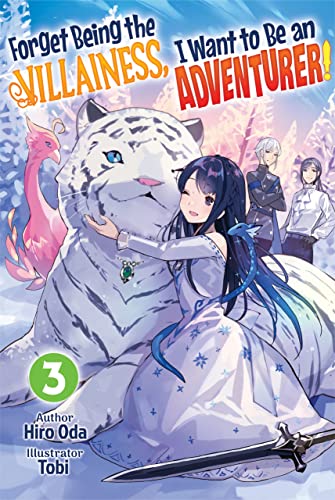By Hiro Oda and Tobi. Released in Japan as “Tensei Reijou wa Boukensha wo Kokorozasu” by Kadokawa Books. Released in North America digitally by J-Novel Heart. Translated by Kim Louise Davis.
One of the gimmicks in My Next Life As a Villainess is that every reader laughs at Katarina continuing to prepare for her own doom, as they know that if she’d just relax and enjoy life with her harem, everything would be fine. Of course, later volumes show that’s not actually true. One of the things we’ve seen about villainess novels is that the narrative does not like being flouted, and will do its very best to make sure our villainess dies as she’s supposed to do. And few series have quite gone as hard about it as Forget Being the Villainess, I Want to Be an Adventurer!. Even though last book ended with Serephione safely ensconced in another kingdom, and with a fiance who adores her, there’s still the “heroine” to deal with. And this heroine may be the nastiest, most evil one we’ve seen to date. actually, that may be the book’s one big flaw: Maribelle gets no tragic backstory she’s just The Adversary.
As Serephione settles into her new kingdom, various parties try to bring her back to the old one. Her family is OK with her being there as long as she’s safe, though they want to actually see her again. But when the first prince comes himself to beg her to side with him, and her grandmother is cursed and nearly dies, it becomes apparent that there’s no real way of getting out of this throne war. Especialyl when the king is a drugged puppet, the queen is getting revenge on everyone, Schneider is still trying to destroy the book series he hated when he was back in Japan, and Maribelle… well, Maribelle remains a bit of an evil in the shadows until she’s finally forced to come out. When she does, it’s time for a magical duel, which normally Serephione would have no problems with, but Maribelle has the power of a different god on her side.
I get the sense that the writer of this book wanted to go for the tragic ending but the publisher made them stop. The ending, with Serephione resolving to be reincarnated as a warm breeze to always follow her beloved (and woe, that’s an absolutely wonderful moment) feels a lot more valid than what we actually get, which is “remember that scene where you wished on a star? No? Well, we’re cashing it in.” I was also annoyed that Erza came back, as I wanted her to, only to essentially be written out of the book due to Maribelle’s curse. That said, as I mentioned above, the biggest flaw in this book is that Maribelle is a one-note antagonist, whining and screaming when things don’t go her way. She gets the “love interests” on her side due to the power of the narrative, but I would have appreciated at least a little better idea as to what drove her to this.
So, in the end, a flaws series, but I was happy to read it. Three volumes seems just about right. Recommended for villainess fans.
